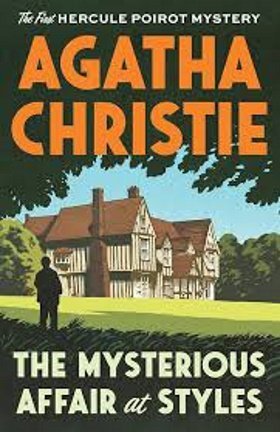“One thing at a time. As to the sleeping powders, I knew by this.” He suddenly produced a small cardboard box, such as chemists use for powders.
“Where did you find it?”
“In the wash-stand drawer in Mrs. Inglethorp’s bedroom. It was Number Six of my catalogue.”
“But I suppose, as the last powder was taken two days ago, it is not of much importance?”
“Probably not, but do you notice anything that strikes you as peculiar about this box?”
I examined it closely.
“No, I can’t say that I do.”
“Look at the label.”
I read the label carefully: “‘One powder to be taken at bedtime, if required. Mrs. Inglethorp.’ No, I see nothing unusual.”
“Not the fact that there is no chemist’s name?”
“Ah!” I exclaimed. “To be sure, that is odd!”
“Have you ever known a chemist to send out a box like that, without his printed name?”
“No, I can’t say that I have.”
I was becoming quite excited, but Poirot damped my ardour by remarking:
“Yet the explanation is quite simple. So do not intrigue yourself, my friend.”
An audible creaking proclaimed the approach of Annie, so I had no time to reply.
Annie was a fine, strapping girl, and was evidently labouring under intense excitement, mingled with a certain ghoulish enjoyment of the tragedy.
Poirot came to the point at once, with a business-like briskness.
“I sent for you, Annie, because I thought you might be able to tell me something about the letters Mrs. Inglethorp wrote last night. How many were there? And can you tell me any of the names and addresses?”
Annie considered.
“There were four letters, sir. One was to Miss Howard, and one was to Mr. Wells, the lawyer, and the other two I don’t think I remember, sir—oh, yes, one was to Ross’s, the caterers in Tadminster. The other one, I don’t remember.”
“Think,” urged Poirot.
Annie racked her brains in vain.
“I’m sorry, sir, but it’s clean gone. I don’t think I can have noticed it.”
“It does not matter,” said Poirot, not betraying any sign of disappointment. “Now I want to ask you about something else. There is a saucepan in Mrs. Inglethorp’s room with some cocoa in it. Did she have that every night?”
“Yes, sir, it was put in her room every evening, and she warmed it up in the night—whenever she fancied it.”
“What was it? Plain cocoa?”
“Yes, sir, made with milk, with a teaspoonful of sugar, and two teaspoonfuls of rum in it.”
“Who took it to her room?”
“I did, sir.”
“Always?”
“Yes, sir.”
“At what time?”
“When I went to draw the curtains, as a rule, sir.”
“Did you bring it straight up from the kitchen then?”
“No, sir, you see there’s not much room on the gas stove, so cook used to make it early, before putting the vegetables on for supper. Then I used to bring it up, and put it on the table by the swing door, and take it into her room later.”
“The swing door is in the left wing, is it not?”
“Yes, sir.”
“And the table, is it on this side of the door, or on the farther—servants’ side?”
“It’s this side, sir.”

























